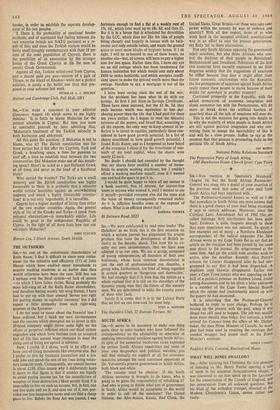THE OUTSIDERS SLR, — As one of the unfortunate shareholders of Rolls
Razor, I find it difficult to share your enthu- siasm for the initiative and cfliciency (?!) of John Bloom which have enabled many households to acquire washing machines at an earlier date than would otherwise have been the case. Still less can I enthuse over the fiscal system—or lack of system —to which I have fallen victim. Being probably the most left-wing of all the Rolls Razor shareholders, and therefore having mainly left-wing friends, I have had to put up with their amused 'Serves you right for putting money in capitalist concerns,' but I did expect a little sympathy from such right-wing quarters as the Spectator.
I do not want to moan about the financial loss I have suffered, but I think my own circumstances and the reasons which prompted me to invest in this ill-fated company might throw some light on the effects of perpetual inflation, which our fiscal system engenders and which have become such an accepted fact of life that annual wage increases to meet the rising cost of living are agreed in advance.
Now, I could, if I chose, work in an office and have cost-of-living increments like everyone else. But I prefer to live by freelance journalism and a few odd jobs and spend the rest of my time doing volun- tary (unpaid) work. Consequently, my annual income is about £150. (One reason why I deliberately keep it down to that figure is that it enables me legally to avoid paying income tax for the manufacture of weapons of mass destruction.) Most people think it is impossible to live on such an income, but, in fact, one can live quite well on it, and save out of it, too, pro- vided one has inexpensive tastes and can find a cheap place to live. Before the Rent Act was passed, I was
fortunate enough to find a flat at a weekly rent of 17s. 6d., which later went up to 18s. 6d. and then £1. But it is in a house that is scheduled for demolition by the LCC, which does not like the idea of people living cheaply and happily in houses with no bath- rooms and only outside toilets, and wants the ground space to erect more blocks of hygienic boxes. If I sit tight, I will be re-housed in one of these boxes, on another site—but, of course, will have to pay a higher rent for less space. Rather than this, I have my eye on an old cottage which has been condemned for human habitation but which would cost only about £450 to make habitable, and which occupies insuffi- cient space to make the ground worth more than the cottage. Needless to say, a mortgage is out of the question.
I have been saving since the end of the war; but the problem has been what to do with my savings. At first I put them in Savings Certificates. These have since matured, but the if Os. 3d. they each became worth was equivalent to less pur- chasing power than the 15s. that I had paid for them ten years earlier. So I began to read the financial columns of the papers, and found that, according to all the experts, the only way to keep abreast of in- flation is to invest in equities, particularly those con- sidered to have good growth potential. In a list of shares considered to have good growth potential, I found Rolls Razor, and as 1 happened to have heard of the company I chose it for the investment of one- tenth of my total capital, when the shares were nearly .£2 each.
No doubt I should feel consoled by the thought that my shares have enabled a number of house- holds to acquire washing machines; but I couldn't afford a washing machine myself, even if I wanted one and had the space to put it in.
I would be quite, happy to leave all my money in a bank account, free of interest, for interest-free loans to anyone who wanted it, until I wanted to use it myself—provided everyone else did the same and the value of money consequently remained stable. As it is, inflation benefits some at the expense of others. What is so efficient about that?
BARBARA SMOKER
86 Dalmain Road, SE23


































 Previous page
Previous page